I had to fly home this weekend for a funeral, and left Rufus in Kelly's capable care. However, my absence always makes Rufus sad. Cooper did his best to comfort his big brother...
Tuesday, May 08, 2007
Monday, May 07, 2007
Springtime has finally arrived here in the Pacific Northwest, and Rufus and Cooper took the opportunity to lounge around in the grass in Kelly's back yard last weekend.
However, Cooper quickly grew bored with this and initiated a Mouth Jousting session by trodding on Rufus's head.
Rufus retaliated a bit more quickly than Cooper anticipated, catching him off guard.
However, Cooper recovered quickly and and went on the offensive
Finally, Kelly arrived to distract Cooper and save Rufus's bacon
By this point, Cooper had gotten a bit drowsy anyway
With his nemisis otherwise occupied, Rufus seized the opportunity to crash out again
Thursday, May 03, 2007
Kelly has been thinking about bringing another dog into her life since Lucky was killed. She has always wanted a Great Dane, and in fact thought Luck was one when she got him (she was working at a large breed rescue at the time). She has been checking out Dane breeders in our area on the net, and came across one who had a two week old litter. She expressed an interest in paying them a visit, and this seemed like a safe thing to do. After all, it would be 6-8 weeks before they will be ready to go to their new homes, and so she would have plenty of time to think about whether she was ready.
Last Sunday, we drove up to visit the breeder in question. When we arrived and walked around the side of his house to his dog pens, the first thing I noticed was a young Dane in a pen with three females. "Uh oh," I thought, "here we go..." We met the three females (one of which is the mother of the litter we can to see), and checked out the puppies (which were little black and white peanuts whose eyes have not even opened yet). Throughout, this little guy followed Kelly around, gnawing on her ankles and generally let it be known that he thought she was pretty neat. Turns out that he was the last unplaced pup from the breeder's last litter. The breeder was anxious to place him, and offered Kelly a deal if she would take him. I personally think this was not even necessary: Kelly was smitten with him from the moment she saw him. To make a long story short, the little guy, who we eventually named Cooper, came home with us that evening to be part of our family. We have now officially crossed the line from pet owning household to menagerie...
Here is Kelly, obviously VERY happy with her decision just before we loaded up into the car to head home.
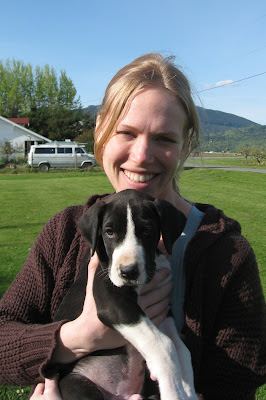 |
| From 2007-04-30 Co... |
As soon as we got home, Nikita and Rufus showed an intense interest in the little guy.
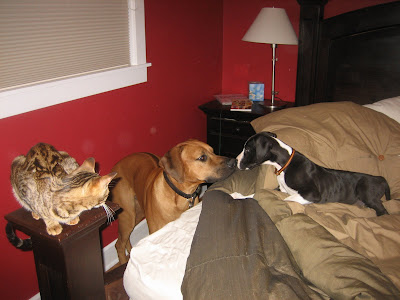 |
| From Rufus and Cooper |
Rufus (ever the gentlemen) offered Cooper his favorite play ball to try out.
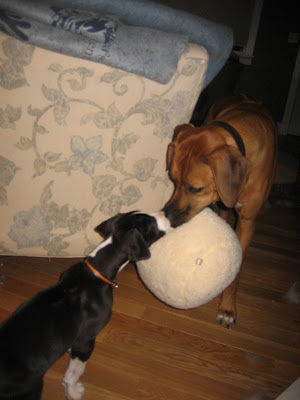 |
| From Rufus and Cooper |
Cooper immediately attacked it with great enthusiasm (although, given his present size, without a lot of effectiveness).
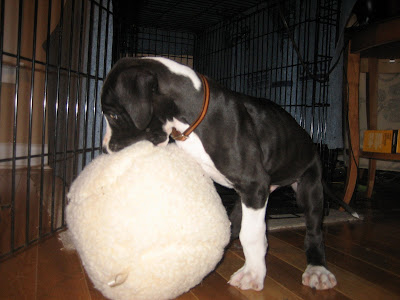 |
| From Rufus and Cooper |
The next day, Kelly took Cooper to work with him. He was hugely excited by this, as evidenced by this photo.
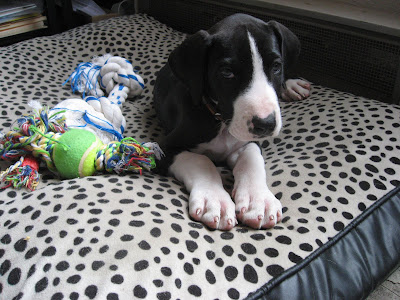 |
| From 2007-04-30 Co... |
However, he soon found all the attention he got from Kelly's co-workers to be exhausting, and curled up for a nap by her desk.
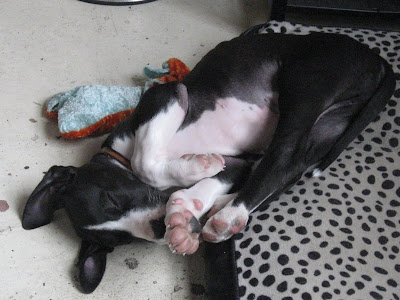 |
| From 2007-04-30 Co... |
The next morning, we got up to feed all the "monkeys", and Cooper decided that Rufus's bowl looked much better than his own (even though we put the same food in both).
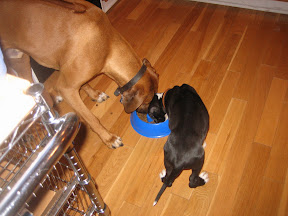 |
| From Rufus and Cooper |
Rufus continues to be a very gentle big brother to Cooper, and looked a bit perplexed as to what to do as Cooper proceeded to snarf down most of Rufus's breakfast.
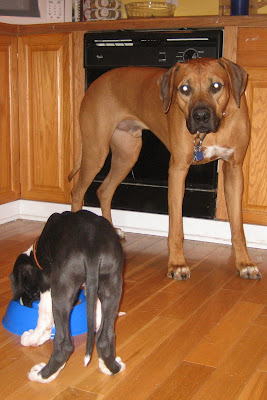 |
| From Rufus and Cooper |
That evening, Rufus commenced to teach Cooper the fine art of "mouth jousting", a game which Rufus used to play with much gusto with Lucky.
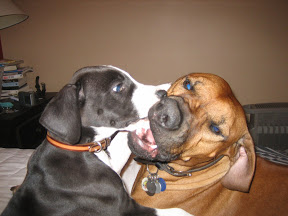
Cooper turned out to be a quick study, and Rufus soon found himself on the receiving end of some adept moves by Cooper.
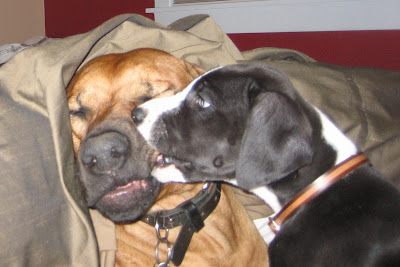 |
| From Rufus and Cooper |
After having Cooper chew on his head for a while, Rufus decided to redirect Cooper's enthusiasm towards a rope chew toy.
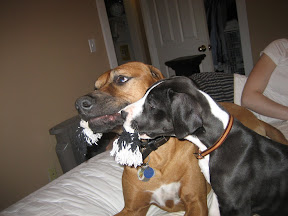 |
| From Rufus and Cooper |
However, Cooper quickly generalized from the rope to Rufus's tail (while is about the same size and consistency). Rufus was not amused.
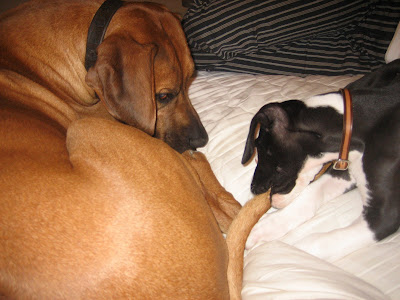 |
| From Rufus and Cooper |
Rufus finally gave up and went back to mouth jousting with Cooper while Nikita observed from her perch at the end of the bed. Eventually, the little guy ran out of steam, and we were all able to get to sleep (abet only for a few hours - we are on "out to pee every three hours" puppy time for now).
Monday, April 23, 2007
Kelly is starting to think about her next canine companion, and has her heart set on a Great Dane. It was therefore an interesting coincidence that Rufus and I met a lovily young lady named Bella on a recent outing to the park.
 |
| From Rufus Meets B... |
After getting acquainted, Rufus and Bella checked out the over pooches at the park
 |
| From Rufus Meets B... |
They then got down to some serious, physical paytime.
 |
| From Rufus Meets B... |
Rufus made one or two attempts to "put a leg over", but Bella quickly shut down this cheeky behavior.
 |
| From Rufus Meets B... |
Sunday, April 22, 2007
Kelly and I somewhat impulsively decided to make a new addition to our family, a Savannah cat named Nikita. The rational behind choosing this particular flavor of kitty was that she will likely to grow up to be larger than your average domestic feline, and should be able to hold her own against the dogs in our household (we got her just before Lucky's death). After some initial attempts to treat her like a furry chew toy, the boys started acting like she was a (probationary) member of the family.
Since Lucky's passing, Rufus and Nikita have gotten more and more at ease with each other (it helps that Nikky grew up around a Boxer with whom she was best friends). Rufus has shown a great deal of curiousty about her (once he figured out that she was not a ferocious creature out to eat us in our sleep).
He followed her here...
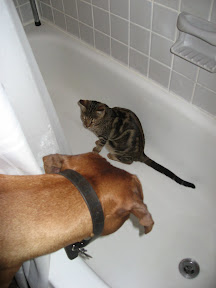 |
| From Rufus and Nikita |
He followed her there (where she took a swipe at him through the door jam)...
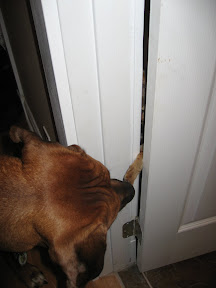 |
| From Rufus and Nikita |
He followed her everywhere until she finally consented to be friends with the big red goof...
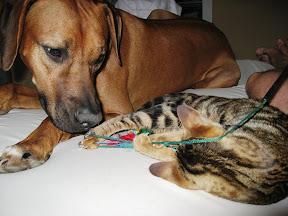 |
| From Rufus and Nikita |
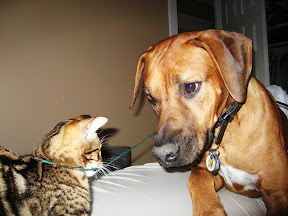 |
| From Rufus and Nikita |
He even offered his back as a big (somewhat boney) red pillow
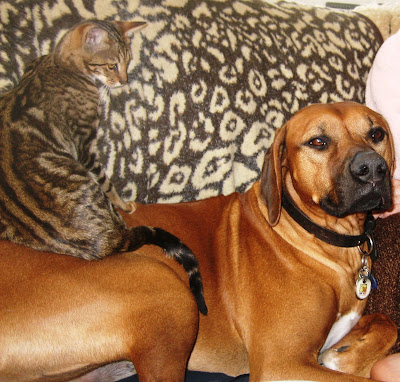 |
| From Rufus and Nikita |
While Nikita is still now sure how to react when Rufus comes bounding towards her or drops a play bow in an invitation to romp, we are optimistic about their relationship...
Friday, April 20, 2007
Thursday, April 05, 2007
Wednesday, March 07, 2007
What You Should Know Before Getting a RR
Kate Zimmer of So. Cal RR Rescue sent me this great note on considerations that should be taken into account before getting a Rhodesian Ridgeback. Even though I've spent almost every day for the past year with Rufus, I still learned something by reading this...
The Ridgeback breed has suffered profoundly in recent years from its popularization as a "lion hunter". Ridgebacks were originally meant to be a medium to large breed, with the correct weight for a male being somewhere between 80 and 90 lbs. Females should be smaller than that, somewhere between 65 and 75 lbs. However it is not uncommon today to see 120+ lb Ridgebacks. This is due to their "lion hunter" reputation - people seem to believe that it must take a really big dog to hunt a lion. However, Ridgebacks did not hunt and take down lions -- even a 120 lb dog would be no match for a 500 lb lion! Instead, Ridgebacks scented and then tracked them (and other game) and then kept the game at bay by being quick and agile. A large, bulky dog simply does not have the quickness or agility to keep itself out of harm's way. Unfortunately, though, the effect of that reputation has been to create overbreeding by irresponsible people breeding for a bigger and "badder" dog. This has resulted in an ever-increasing pool of dogs with health and disposition issues. Some Ridgebacks are being produced in the puppy mills of Pennsylvania, Missouri and Ohio (by far the largest sources of puppy mill dogs in the US) and we see Ridgebacks in pet shops from these sources more and more often. The greatest number of Ridgebacks, however, come from puppy mills in Texas-- unfortunately a large percentage of the dogs we're seeing in California today have been purchased from "breeders" in Texas. Obviously we think that Ridgebacks are a wonderful breed. Ridgebacks are, however, not necessarily the best "starter" dog -- that doesn't mean they can't be but they are a hound breed that was bred to hunt and guard. Anybody wanting to adopt one has to be prepared for those three aspects of their personality which are "hard-wired" into them.

Hounds: independent, bred to think for themselves and work independently of their owners. Think of bloodhounds and beagles. Both of those dogs do their thing and the "master" just follows behind. That is true for Ridgebacks too -- they were bred for that independent thinking -- that's how they survived and did their job.
They are not a "working breed" like a Lab, Rottie, Doberman, Shepherd ... those dogs were bred (and are therefore hard-wired) to work by following the instructions of their owner. This "hound" quality makes training and working with a Ridgeback a challenge for a lot of people but it is how they are SUPPOSED to be. You cannot expect a Ridgeback to respond the way a Lab or Shepherd would because they aren't hard-wired to do so. A Ridgeback is hard-wired to think for himself - a lot of people call that stubbornness and grow frustrated. For that reason it's important that a new Ridgeback owner either has some experience training large breed dogs (other than Labs, Goldens, Shepherds, etc) or is very willing to learn and be very consistent. The cunning that helped Ridgebacks survive on the African veldt means that they see any inconsistencies as weak spots and exploit those very quickly.
Hunting: Ridgebacks were bred to hunt large game and hold them at bay. They did not take down the game. In the US they are classified as sighthounds which means their attention is often focused on things they see in the distance ( i.e. not on their owner!). They were supposed to scan the horizon and use their noses (while they are classified in the US as sighthounds, in most other places around the world they are classified as scent hounds -- truly they are a dual purpose hound) to seek out large game and then, once they'd found it, corner it and harrass it so that the hunter had time to come along and get a shot. For that reason they had to be quick and agile.
Ridgebacks are not a good breed to let off leash for this reason -- most will take off after squirrels, etc. that they see. They are bred to be endurance animals -- to go all day on the African veldt. Their body standard is based off of the Dalmation standard -- a breed that was meant to be able to run alongside the fire truck for up to 20 miles at a time. For this reason it can take a lot to tire out a Ridgeback -- typically several longer runs/walks per week are needed.
Many people ask about Ridgebacks and cats - many Ridgebacks live happily with "their" cats, so long as they are properly introduced. This video demonstrates a Ridgeback quite happily co-habitating with a cat:
However, most Ridgebacks will instinctively chase cats -- so if you have neighborhood cats or an existing cat that is likely to run ( i.e. one that isn't used to dogs) Ridgebacks and cats may not be a good match. Many people believe that getting a puppy is the only way to have a Ridgeback and a cat -- I actually disagree with this but I do think that some adult Ridgebacks (those with a very high prey drive) will never be able to live with a cat. Many (like mine) definitely could be introduced to a new cat and live with it (though I do think that if the cat decided to bolt both of my dogs would certainly scurry after it!)
Rufus and "his" cat, Nikita


Guarding: the correct Ridgeback is a faithful hunting companion and family guardian. Ridgebacks were bred to be faithful protectors of the homestead. They are loyal family dogs but they are very aloof with strangers. Typically they will (briefly) acknowledge a visitor to your home and then quietly position themselves between the visitor and their owner. They have very strong bite inhibition -- remember, they did not take down the game, they just held it at bay -- but it's not suprising to see a Ridgeback back a stranger to the house into a corner and "hold" them there (not physically with teeth but they will keep them cornered there). If you have a very busy household with a lot of comings and goings of various people, this is something to take into consideration. Because of their guarding instinct proper socialization to all kinds of strangers (with hats, on bikes, using walkers, etc) is imperative.
Ridgebacks are usually billed as good family dogs and I whole-heartedly agree with this.

However, because of this reputation they are often acquired by well-meaning but naive folks who don't understand that "good with kids" only comes after proper socialization and "good family dogs" are achieved only with proper handling, raising and training. Because of the independent nature mentioned above, some people find accomplishing this training a bit difficult. They are, if socialized correctly, patient with "their" children (though of course children should never be allowed to harrass dogs) but, in my experience, a lot of running/yelling children not familiar to them is not a great combination. Perhaps that is the sighthound part of their nature -- the running/flailing style of children may incite their natural prey drive.
If you are going to have a large, athletic dog, it is CRITICAL that they be socialized with other dogs. Large dogs, small dogs, hairy dogs, aggressive dogs, passive dogs, etc. Unless you have a large number of friends who have dogs, this means taking your dog to dog parks. For those not experienced with the breed it's important to remember that because Ridgebacks had to be agile and quick they practice those behaviors when they are at play. They tend to do a lot of pouncing and body slamming. They use their paws and mouths (open mouth play, while it can look aggressive, is actually very appropriate play for a Ridgeback) quite a bit.
Here's another link of three Ridgebacks playing - note the both the raw athleticism and the roughness with which they treat each other:
This can be problematic at a dog park because not every dog likes to be body slammed and pounced upon. At the dog park you'll tend to see Labs and Goldens running after a ball or toy (remember, they were bred for this very purpose), and Shepherds and Rottweilers running around (they were bred to herd, remember) -- your Ridgeback *may* do this but it's far more likely that he'll engage in body slamming, paw slapping and quick right/left moves. It's also important to remember that your Ridgeback may decide to play this way (with paw, mouth and body) with young children that he takes to be just two legged pack members - and obviously allowing a dog to play this way with young children is not safe.
They are a wonderful and instinctive protector of their family and home. It is said about Ridgebacks that if they bark you should check it out -- they are not big barkers unless there is a reason. Like any self respecting hound they spend a large portion of their day sleeping and love nothing more than to follow sun patches through the house.

Ridgebacks are famous for being excellent (and devout) "counter surfers". When I was first researching the breed I was told that a typical Ridgeback can be fast asleep (on the couch) while you are preparing dinner. You turn your back to wash a dish or put something into the oven and when you turn back the pot roast that you had sitting out on the counter to cool is gone and your Ridgeback is back asleep on the couch. Though this sounded like lore to me when I was researching the breed I have since learned (through my own Ridgeback and many many foster dogs) that this is actually not far from the truth. For your own sanity and for the health of the dog, you'll want to keep your counters free from food and, in general, prevent access to trash cans that might contain food. Ridgebacks, like any deep chested dog, are prone to bloat - something that can easily come on if your dog gorges himself on food from the counter.

The national Ridgeback club's website (www.rrcus.org) has several very good articles about Ridgebacks and to help you decide if Ridgebacks truly are the right breed of dog for you. Here are links to two that I think are very important to read:
http://www.rrcus.org/assets/html/breedinfo/For_you.htm
http://www.rrcus.org/assets/html/breedinfo/living.htm
Monday, March 05, 2007
Rufus is now a 15 month old intact male, and is predictably starting get a bit more assertive toward other dogs. This takes the form of humping. I generally monitor this to see if the other dog is ok with it, and to insure that Rufus does not become too persistent. I'm ok if Rufus gets "whacked" as long as the other dog stays in control. However, on Friday Rufus went to "put a leg over" a 2-year old Rotty mix, and the other dog spun on Rufus and went after him. There was a lot of noise and scuffling, and Rufus came out on the short end of the stick (Rufus is generally a beta male, and to date has never been in a true fight). Had no blood been drawn, I would have been ok with this. I think dogs are the best teachers of canine manners, and Rufus benefits by correction by other dogs. However, Rufus ended up with two 1cm slashes on the inside of his eyelid, necessitating a trip to the vet.

No stitches, but he had to wear "the lampshade" all weekend and his eye is still red and puffy. Rufus has not been a happy puppy the last few days...

In a subsequent email conversation with the other dog's owner and a friend of his, I started to feel like a negligent doggy daddy. By allowing free rein to Rufus's adolescent urges, had I inadvertently created a situation in which he was set up to get hurt? Was I the irresponsible parent who allowed his child to play in traffic? I sought the counsel of Christine Dahl, owner of Seattle Dogworks, whose opinion on training I respect and trust. My question was how to best to help Rufus safely get through his adolescence as an intact male. It seems that humping is seldom welcome behavior on the part of the "humpee". I just hope he will start to figure this out such that we don't have to make any more trips to the vet along the way...
Her answer follows:
